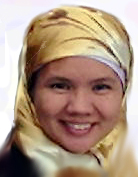(this is Part 3/4 of the essay Peace, Security and Identity: A proposal for the youth of Southeast Asia)
(read Part 2)
Indeed, the question of strength boils down to a question of identity. Finding our own identity -- as individuals, communities, nations, and now, as a region -- is a task that we have to collectively undertake. For to be secure in our own identity and in our capacity to uphold such an identity is the one prerequisite to peace. We tend to think of security as security of livelihoods, of food, of homes, and economies, security based on environmental and material conditions. As a result, we tend to define ourselves within the context of what we can do and who we can “be” within such conditions. This kind of security is put into question when communities are under the state of war or under poverty. Thus, such communities define what to them is essential and develop value systems that enable them to obtain these essentials.
Even during peacetime, we can experience circumstances when we lose our sense of security. One such experience is travel. When one travels, one leaves security to indulge in being in the thick of new contexts and cultures, and thus one loses security (and therefore, security in their identity) for a spell and can therefore look back at their lives with a new perspective. Thus, travel, whether for business, pleasure, or as a religious requirement, is a necessity in the quest to define our identity.
There is, however, another kind of security. Communities who have endured, nay thrived, in centuries of protracted war have found security not in their capacity to control their environment but in their capacity to know of their inner selves. Such communities value knowledge of self and of the relation between the whole and its parts, and how things come full circle, above all kinds of knowledge and possessions. Happily, the ASEAN region has a rich spiritual tradition. This kind of knowledge – and thus, this kind of security and identity – is not so inaccessible for the ASEAN youth, specially today.
Indeed, peace is not a characteristic of institutions but is an effect of internal peace within individuals, communities, and nations, but it is important for institutions such as the ASEAN to create mechanisms to encourage it. If likened to a deck of cards, institutions can create the Spades (governance), the Clubs (military), and the Diamonds (economy), but only communities can hold the Hearts.
(on to Part 4)
(to add: Another situation where one finds lack of security is during a severe or prolonged sickness in the family, which is one of the reasons why sickness is considered a blessing.)

